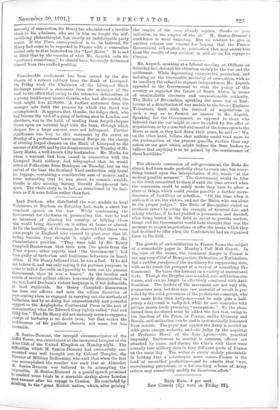The growth of anti-militarism in France forms the subject of
a remarkable paper in Monday's Pall Mall Gazette. In the view of the writer, the imminent danger in France is not any coup d'itat of Bonapartists, Orleanists, or Nationalists, but a sudden paralysis of the machinery for suppressing riots, with as its result the prospect of a revival of something like Commune. He bases this forecast on a variety of uncontested facts. Though the Dreyfus case is ended, anti-militarism con- tinues, and can no longer be effectively countered with Anti- Semitism. The leaders of the movement are not only able, pugnacious men, but first-rate raw material of revolt is pro- vided by the solid grievances of the proletariat conscript, who gets more kicks than halfpence—and he only gets a half- penny a day—and is badly fed, while he sees comrades with private means freely procuring "exemptions." To the class- hatred thus developed must be added the fact that, owing to the freedom of the Press, in France, unlike Germany and Russia, anti-militarism can be and is systematically fomented from outside. The paper war against the Army is carried on with great energy, audacity, and—to judge by the acquittal of Professor Herve of the Sens Lyccle—with practical impunity. Incitement to mutiny is common, officers are attacked by name, and during the Czar's visit there were actually four military riots in four different parts of France on the same day. The writer is surely unduly pessimistic in holding that a catastrophe must come—France is the land of unverified predictions—and he admits that "war, reawakening patriotism, or a far-reaching scheme of Army reform may conceivably modify its disastrous effect."














































 Previous page
Previous page